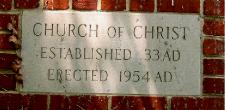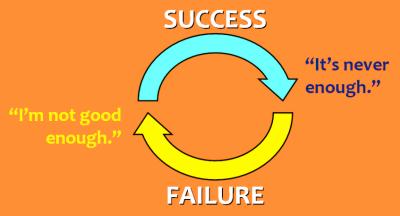CONSIDER ABRAHAM
 Click here to listen to this sermon.
Click here to listen to this sermon.
Galatians 3:6-14
 On many church buildings there is a stone that reads Established AD 33 Its an attempt to show that the spiritual church of Christ was established with the crucifixion and the building is just a building erected on some more recent date.
On many church buildings there is a stone that reads Established AD 33 Its an attempt to show that the spiritual church of Christ was established with the crucifixion and the building is just a building erected on some more recent date.
In Galatians, Paul considers that the church has roots than go through the event of 33 AD and back to around 2000 BC. He wants us to consider Abraham Father Abraham who is the father of the people of God.
- Father Abraham had many sons, and many sons had Father Abraham. I am one of them, and so are you, so lets all praise the Lord.
- I cannot answer why we do the right hand, left hand, turn around but how did we all get to be Abrahams children?
It isnt a bloodline or national heritage that creates the link to Father Abraham, it is a matter of faith
Abraham "faithed" ...
- The word pistis is translated with two different English words. The noun is faith and the verb is believe. But we have a noun (belief) that goes better with believe. We have another word trust that is both noun and verb. I wonder if it might be a better translation?
- Read Genesis 15:1-6. Some time later, the Lord spoke to Abram in a vision and said to him, Do not be afraid, Abram, for I will protect you, and your reward will be great.
But Abram replied, O Sovereign Lord, what good are all your blessings when I dont even have a son? Since youve given me no children, Eliezer of Damascus, a servant in my household, will inherit all my wealth. You have given me no descendants of my own, so one of my servants will be my heir.
Then the Lord said to him, No, your servant will not be your heir, for you will have a son of your own who will be your heir. Then the Lord took Abram outside and said to him, Look up into the sky and count the stars if you can. Thats how many descendants you will have!
And Abram believed the Lord, and the Lord counted him as righteous because of his faith.
- Abraham trusts God for his future and for his salvation.
- Its a recommitment to the covenant and call in Genesis 12:1-3.
The Lord had said to Abram, Leave your native country, your relatives, and your fathers family, and go to the land that I will show you. I will make you into a great nation. I will bless you and make you famous, and you will be a blessing to others. I will bless those who bless you and curse those who treat you with contempt. All the families on earth will be blessed through you.
- Paul considered this to be the gospel beforehand or good news. Theres your link to 2000 BC
The Curse of Law ...

- Unfortunately, theres a tempting and seemingly harmless alternative to faithing like Abraham did.
- It is reliance on the law. We can rely on faith (which can be intangible and comes down to trust) or we can rely on law which we can get our hands on, it involves action. It has a lot of words that we can discuss.
- But Paul says it comes with a curse. The curse is the fact that law cannot make us as righteous as it requires.
- The very self-justification that the law requires is impossible. We are stuck in a self-defeating loop.
- Now before we go any further, lets be clear what we mean about law. It's our tendency to think we just mean Old Testament. And we sigh relief and say, Thank goodness we got rid of all that.
- But did we? Honestly, did we?
- Its not some museum piece. Its for our learning. Really? That would mean Old Testament matters about as much as Tobit or Judith or the Gospel of Judas.
- The Old Testament is the bible of Paul and Jesus. Paul is quoting it right here as if it has authority and weight in the New Testament age.
- So I dont think we want to just get rid of it.
- Law is not the same as Old Testament. It is the system of conduct and religion that many of the Old Testament books contain.
- But law for us should be understood as any system or code that becomes our attempt to reduce Gods will to requirements that become self-reliance, self-improvement, and self-justification.
- Whenever we attempt to establish our worth in church or to God by means of our abilities and achievements, then we are relying on law.
- That traps us in a cycle of slavery
- Even when we are successful, we are never satisfied. It isnt enough.
- We become aware of our imperfect, our failure. I am not good enough.
- Perhaps one of the clearest ways we have seen this curse slip in is in the common phrase What must I do to be saved?
- The question is fine, but in our responses weve often neglected the part about what God did and what he does.
- When church becomes a discipline of making sure we do enough to be saved, the curse slips in.
- When worship is a process of doing specific things off the approved list regardless of what we think or feel and it become nothing more than ones duty, the curse slips in.
- When faith becomes a wearying effort to always do what is required so that we are not wrong and do not fail, thats the curse.
- But where is our trust? How do we become righteous when we are preoccupied with not doing wrong?
- The righteous shall live by faith! Just like Abraham.
Christ Redeems ...
- Christ sets us free from the curse. He rescues us from slavery. (The word used here has to do with the emancipation of slaves. It is a marketplace term.)
- He becomes the cursed
- We become the blessed even the Gentiles.
- Christ Jesus, his submission to God on the cross, undoes the cycle of hopelessness.
- God has been consistent throughout its about faith becoming righteousness:
- Abraham faithed
- Christ faithed in God
- We faith in Christ
- Through faith, we share in the promise of the Spirit.
Chris Benjamin
West-Ark Church of Christ, Fort Smith, AR
Morning Sermon, 8 August 2010
 Link to next sermon
Link to next sermon
 Link to other sermons of Chris Benjamin
Link to other sermons of Chris Benjamin
 On many church buildings there is a stone that reads Established AD 33 Its an attempt to show that the spiritual church of Christ was established with the crucifixion and the building is just a building erected on some more recent date.
On many church buildings there is a stone that reads Established AD 33 Its an attempt to show that the spiritual church of Christ was established with the crucifixion and the building is just a building erected on some more recent date.

 Link to next sermon
Link to next sermon
 Link to other sermons of Chris Benjamin
Link to other sermons of Chris Benjamin